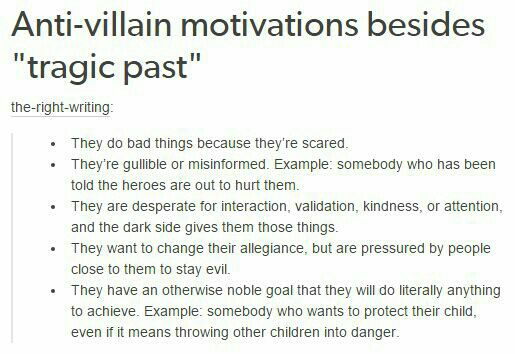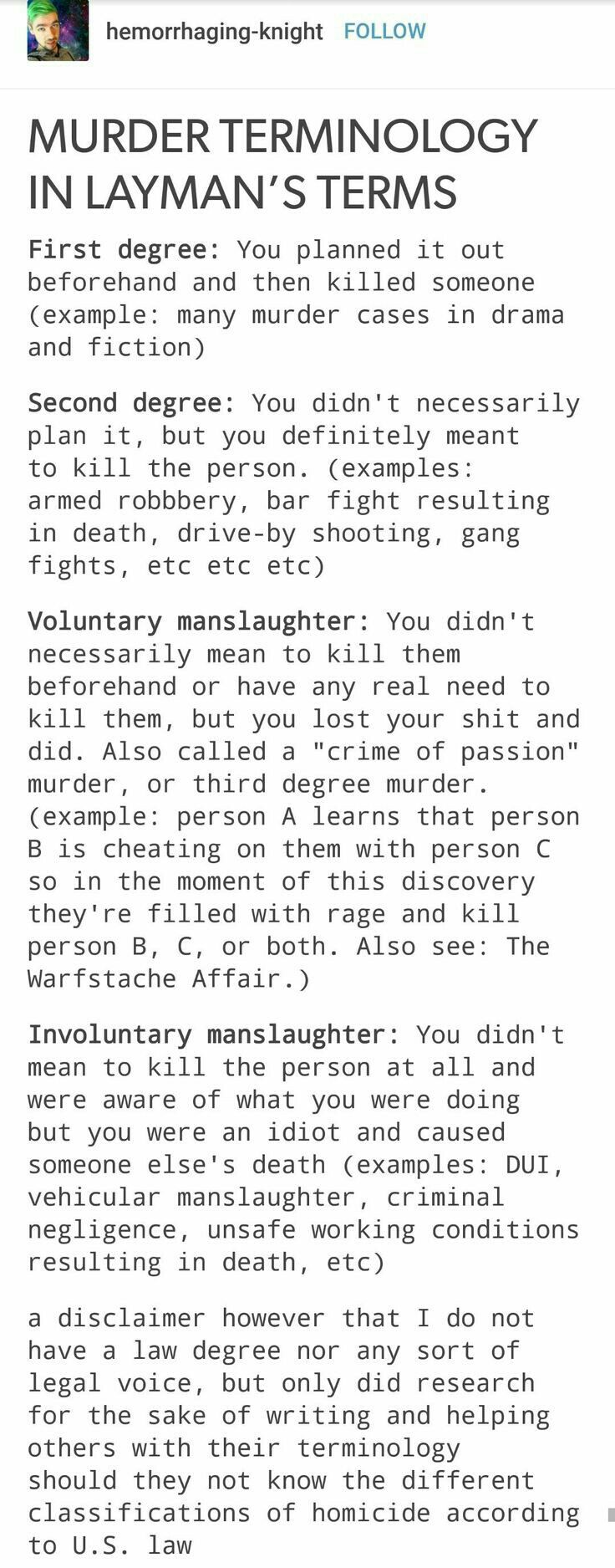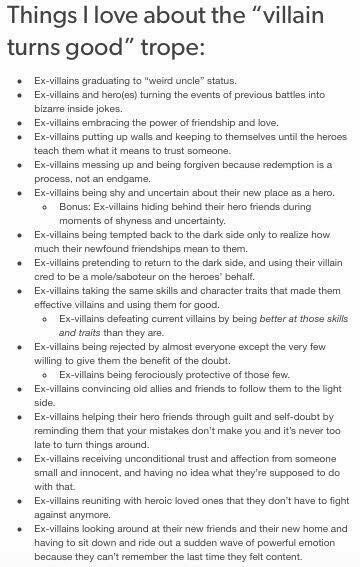* The Antagonist
I can't believe how and why I forgot to write this absolutely necessary chapter.
First of all, there is a great difference between a Villain and an Antagonist.
A villain is defined as: the principal bad character in a film or work of fiction OR a wicked or evil person; someone who does evil deliberately.
An antagonist is defined as: someone who offers opposition.
I prefer having antagonists in the story not mere villains. Because there is much more to an antagonist as compared to a villain.
Today we will be discussing how to add good antagonists in your Fanfiction.
Remember that antagonists are just as significant as the heroes or protagonists. Not only does it give balance to your story but it also gives more room for character development in the protagonist.
While it is not really necessary to include one, still there are many ways you can improve your story by the introduction of a powerful antagonist. The only stories which work without antagonists are either Romantic Comedies, Humor based works or stories in which main character suffers from an internal conflict or strives for their own development (the best example being One Mountain Away by Emilie Richards and Anne Of Green Gables by Lucy Montgomery).
So let's move on to the main topic: what qualities should an antagonist have and how to correctly orient them in a story.
FOUR ESSENTIAL PRINCIPLES FOR CREATING THE ULTIMATE ANTAGONIST:
1. A powerful antagonist is uniquely adept at attacking the hero's greatest weakness.
2. The antagonist pressures the protagonist into making difficult choices.
3. The antagonist competes for the same goal as the protagonist.
4. A powerful antagonist causes the protagonist to grow.
WHAT YOU SHOULD DO WHILE CREATING AN ANTAGONIST:
1. Identify him/her as a character:
The first and foremost thing you have to ensure is whether you truly identify your antagonist as a vital character in your story or not. An antagonist is also just as important as the protagonist and needs just as much attention. And for that you have to first make sure that you have a connection with him/her as well.
2. Assign a back story:
No one is born evil in this world. The saying is so far true and you should follow that in your stories. Human always have reasons behind their actions. So anyone can not just be bad because they're supposed to. They should have a reason for it.
The best way to find reasons for your antagonist is to probe further into their past life. What was it that made them shun all good and go down the evil path? Was it something bad that happened to them from those who call themselves good?
For example, let's suppose your antagonist is a serial killer but he/she only kills policemen and law enforcers. Now the possible reason for that may be he/she had to suffer through policemen and law enforcers. Like maybe his/her parents got sent to jail for a crime they didn't commit, or got hanged, or got killed in a police encounter.
3. Show both sides of the picture:
It is important for your readers to connect with your protagonist, after all it is this main character they have been rooting for since the beginning and will accompany throughout the whole journey. But you should also make them connect with your antagonist.
A good antagonist is always relatable. If readers relate with your protagonist as well as the antagonist, it makes them more involved in the story. And since usually the antagonist is the shadow of the good guy (the possibility pf what he could have turned to if he went down the wrong path), you have more chances to show your readers all the relatable signs and traits and to depict just exactly what made them descend to their own downfall.
4. Let your antagonist win:
Okay, I can hear some people disagreeing on this one. So please, why not just read it all and then give the opinions in the comments, right?
You have to let the antagonist win a few battles as well. Because if every single time, the hero wins and keeps on winning the story becomes a giant bore.
How will your protagonist truly realize the value of success if he/she has not ever faced a failure? And that's where the antagonist comes in to the picture.
No one wants to read about an incredible hero with no weaknesses. Even the invulnerable Achilles had his weakness in the form of his heels. Same goes for Oedipus and other mythological heroes you read about.
You have to let the hero fail a few times. Because a human's true character is revealed when he/she is in adversity. By letting your hero fail you have a great chance at displaying his hidden weak side to the readers. That can make the readers sympathize and relate with your characters. And we all know, when readers sympathize they tend to get more involved in the story.
5. Justify his/her reasons:
Remember that the bad guy thinks he is on the right track usually, so you have to clear it up in the minds of your readers by giving answers to these questions as what made them do this, what caused them to commit that crime etc.
You have to give reasons and clearly explain them. Let's consider the example of the cop serial killer I mentioned earlier. You can not proceed with the story unless you justify his actions. Readers want answers and being a writer it is your job to deliver them. The only way for your story to be almost perfect is if you leave no stone upturned in assuring the perfection of your content.
WHAT YOU SHOULD AVOID AT ALL COSTS:
1. Black and White characterization:
No person is all black or all white. There are both aspects of light and dark in all of us. You can not write an antagonist completely like Lord Voldemort from Harry Potter. As mentioned earlier, you need to have a reason for that and Miss Rowling had devised it for her works in the form of Voldemort being conceived under a love potion and thus being totally vile, evil and a dark character.
Since there aren't any phials of Amortentia in the TVD World so we will have to overrule that one exception.
You have to keep your antagonist in the grey region and the best example for you to consider will be the Mikaelson family from TVD. We all know that the Mikaelsons are not all sunflowers and gold, they have both their shares of good and evil. Elijah and Klaus are the biggest proof of that.
You can also consider Damon and Stefan if you like, or Katherine Pierce for that instance. The only person I think of as somehow closest to the the black region of antagonism, it is Kai Parker. Other than that TVD is a beautiful mixture of all shades and tints of grey characters.
2. Deliberate and impulsive wrong doings:
Quite similar to the first one, you should not make a villain do wrong just because he/she felt like it. Unless your antagonist is a psychopath with no self control, I would advise you to take no other exceptions for this.
3. Getting away with everything:
Think of this as an unforgivable curse which gets you sent to the lifelong literary prison.Your heroes can not get away with everything. Neither can your villains get away with whatever they want to.
Your antagonist can not just burn down a whole town and then stand at the debris laughing like a maniac saying, "at last, no one can take my Diane away from me. Because they are simply not alive to even think of that anymore."
Remember this one famous proverb: What goes around comes around.
You have to devise the appropriate consequences which will ensue from such an act because as we all know, everything done in this world yields its respective consequences.
If your antagonist stole the girl and is living happily ever after with her as his lawfully wedded wife in a cozy little cottage with a happy little family, this is one unexpected twist but it is also very illogical.
There is truly a fine line between unexpected turns and illogical moves. And you have to tread very carefully so as not to disrupt the balance in between.
4. Aimless opposition:
It is extremely important for your antagonist to offer up an opposition but more importantly, it is the aim of the opposition that counts.
If your antagonist is just there to get a stuck story moving by stealing the girl, killing a best friend or causing a pointless war, then he/she is just killing the time and that isn't going to turn out in your favor.
Believe me when I say, reasons are very very important. Every single action has a reaction and also it has a reason which causes it. Make sure to give reasons to whatever your antagonist is doing.
For example, suppose that Klaus is the antagonist and he kidnaps the protagonist's (Salvatore brothers) close friend and tortures her and blah blah blah. Now he should have a reason for it too. He's not going to waste his time torturing a dear little seventeen year old just because he can, he has a lot other work on his hands which he would rather do in that time. But if the writer clarifies that this whole thing was done to force out information from the Salvatores regarding the moonstone or any other issue you wish to insert, then it would make a lot more sense.
EXAMPLES OF ANTAGONISTS YOU CAN REFER TO:
The Joker from Gotham City / Batman / whatever the name is.
Hades from Hercules
Draco Malfoy from Harry Potter series (J.K Rowling)
Julia Snyde from Gentlemen And Players (Joanne Harris)
Queen Elizabeth from The Queen's Fool (Philippa Gregory)
Marisa Coulter from His Dark Materials (Philip Pullman)
Ravello from Peter Pan In Scarlet (Geraldine McCaughrean)
Mrs Danvers from Rebecca (Daphne De Maurier)
Iago from Othello (Shakespeare)
Lady Macbeth from Macbeth (Shakespeare)
Long John Silver from Treasure Island (R.L Stevenson)
IDEAS FOR YOU TO USE YOUR ANTAGONIST:
There are many ways you can use your antagonist instead of just having him/her there to cause drama and fights.
One trick to make your story unbelievably intriguing is to have the main point of view from the antagonist. Your antagonist can be the narrator and not only would this serve to add a mysterious touch but also it can make things a lot more interesting and unique.
For example, in Joanne Harris's bestseller Gentlemen And Players, the narration is done by the antagonist. The writing style is so unique and captivating that it instantly pulls the readers in. Even till the last page it is downright impossible to guess who the real culprit is and who is on the right side.
While everyone in the writing community knows and mutually agrees that the best way to capture a reader fully in your hold is through taking him/her by surprise. Which is exactly what Joanne Harris excels in.
Another way that most people find helpful is to unstuck a jammed story. It's when you get writer's block and have no idea what to do next. Most people introduce an antagonist to turn the course of the story and for some it works out. But keep all the above points in mind if you do this. No one wants to read about an antagonist who is just there to cope up with writer's block and serves no other purpose in the story whatsoever.
Antagonists are also really helpful when you have to depict a different side to your protagonists. Thus, the whole clash between the antagonists and the good guys can be used as a means of showing character development and adding deeper themes into the story.
POSTS HELPFUL FOR CREATING AN ANTAGONIST:

Link to refer if the picture is blurred:
https://pinterest.com/pin/AWKazn5FE7RXqiH_5kbGOJdYGzaAXrVzcO2C9VAfG4HNNXhhUn8XVQE/?source_app=android







***
And that is all for today.
Hope this was helpful.
Bạn đang đọc truyện trên: Truyen247.Pro